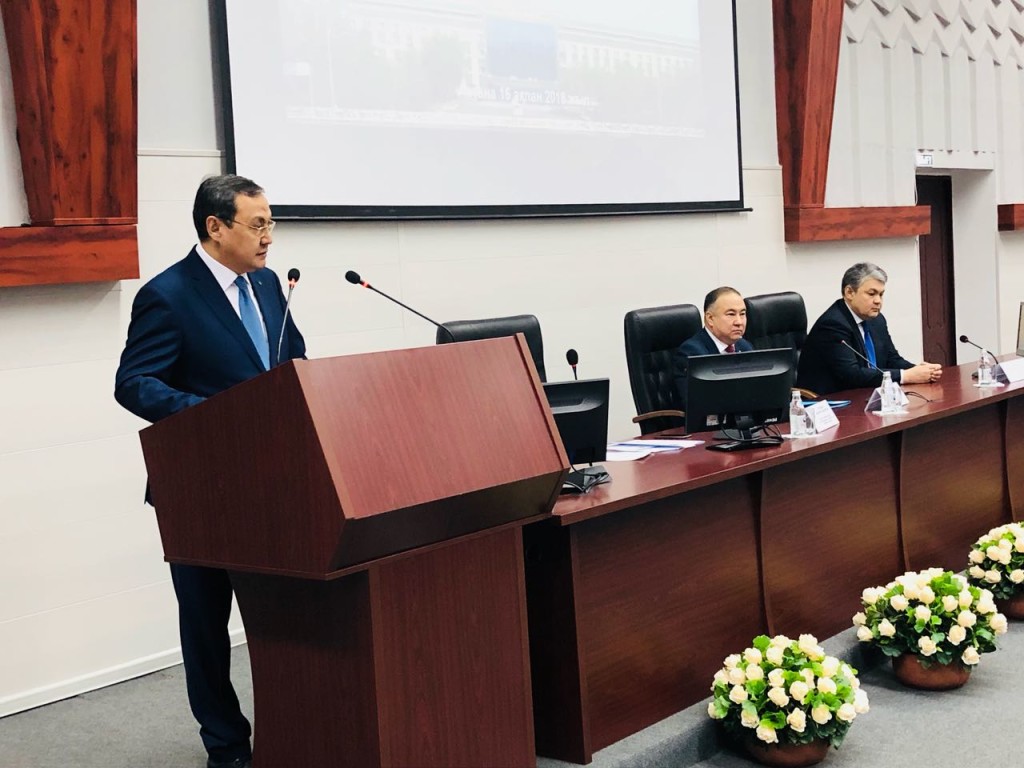ASTANA – Seifullin Kazakh Agrotechnical University will become the scientific and methodological centre for digitisation in the agro-industrial sector, university rector Akhylbek Kurishbayev said at a Feb. 16 press conference marking the beginning of a new phase of cooperation between the university and the local government.

L-R University Rector Akhylbek Kurishbayev, Akmola region governor Malik Murzalin and Executive Secretary of Ministry of Agriculture Yermek Kosherbayev.
The university and the Akmola region akimat (local executive body) on Feb. 16 signed a memorandum on cooperation in the field of scientific and innovative development of the agro-industrial sector. The cooperation is intended to benefit both sides: it will improve the quality of student learning while farmers will receive new technologies and modern production methods.
“According to our proposal, we will now choose two farms in the Akmola, North Kazakhstan, Kostanai and Karaganda regions, according for the lion’s share of the country’s grain production, to demonstrate what the precision technology is, what it gives and how it decreases costs. This year, two projects will be launched and each farm will be a smart technology centre,” he said.
The collaboration will focus on three main directions: the implementation of innovation in agriculture and the transfer of foreign technology, employment of young qualified specialists, and distribution of knowledge among regional manufacturers.
Kazakh President Nursultan Nazarbayev has set a national goal of developing the agro-industrial sector using smart technologies. This cooperation is the first step in implementing this initiative, said Kurishbayev.
The university also intends to collaborate with the Ministry of Agriculture, as the Project Management Centre will be located at the university.
Labour productivity in the agro-industrial sector and export of processed agricultural products is expected to increase by at least 2.5 times within five years. Digital technology will help achieve this.
The university will participate in the process of technological re-equipment of production.
“We can control issues related to land management in crop production. Last year we won the contest and the university can monitor harvesting in the northern regions. Our scientists can also help carry out selection and breeding work, large-scale breeding, artificial insemination of cows, boning livestock. Graduate students can take part in carrying out veterinary and preventive measures throughout the region as part of the Vetservis regional utilities. They will get invaluable practical skills to become highly qualified specialists,” he said.
The university plans to organise training courses for regional specialists in all directions on a regular basis.
The agrotechnical university has 20 partner institutions abroad. The University of California in Davis is the major partner in running educational and research systems reforms.
Akmola region Akim (Governor) Malik Murzalin spoke about the current agricultural situation in the region.
The region is one of the largest agricultural producers. It produces 25 percent of Kazakhstan’s cereals, 7 percent of its milk and 6 percent of its meat. Last year, the harvest was 5.2 million tonnes of grain. Every year, the region exports 1.8 -2 million tonnes.
“Good results were achieved due to state support. Last year about 38 billion tenge [US$118 million] was allocated for subsidising the industry. More than 29 billion tenge [US$90 million] at minimal interest rates was provided through various financial institutions. This allowed us to increase the number of agricultural producers who received government support 1.4 times and provide 1.5 times more fertilisers,” he said.
In addition, there is a positive tendency in the growth of livestock and livestock production. Cattle stock increased by 2 percent.
Murzalin stressed that farmers are in need of new ideas and proposals to implement in production.
“We have high hopes for the memorandum and look forward to the results of our cooperation,” he said.
Display stands with advertising materials and information about specific services are expected to be installed at regional offices. Scientists are invited to take part in seminars and meetings dedicated to agricultural development issues. Students now have the opportunity to participate in internships during the harvest campaigns.
